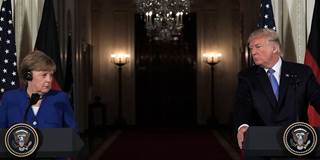 Alex Wong/Getty Images
Alex Wong/Getty Images
默克尔的报应是欧洲——乃至世界的——不幸
约翰内斯堡——欧洲领导人在解读美国总统唐纳德·特朗普针对美国传统盟友所表现出来的敌意、或者特朗普政府迫不及待地推翻国际秩序时最常犯的一个错误就是假定这一切行为都史无前例。但这根本就不是事实。
“我的哲学是所有外国人都想搞死我们,因此我们要做的就是先把他们搞死。”1971年时任美国财政部长约翰·康纳利在成功说服理查德·尼克松总统通过终止布雷顿森林体系来惩罚欧洲时就曾这样提出。
同样,特朗普肯定会同意“在平衡稳定的国际体系所提出的要求和保持国家政策的自由度之间,”美国明智地“选择了后者”。时任纽约联储主席保罗·沃尔克在七年后的一次演讲中评价尼克松决策时曾这样说。这位美联储未来的主席进一步宣称“20世纪80年代的合理目标是…世界经济有控制的解体”。
https://prosyn.org/blKIpwpzh
To continue reading, register now. It’s free!
Register Now
Already have an account?
Log in



约翰内斯堡——欧洲领导人在解读美国总统唐纳德·特朗普针对美国传统盟友所表现出来的敌意、或者特朗普政府迫不及待地推翻国际秩序时最常犯的一个错误就是假定这一切行为都史无前例。但这根本就不是事实。
“我的哲学是所有外国人都想搞死我们,因此我们要做的就是先把他们搞死。”1971年时任美国财政部长约翰·康纳利在成功说服理查德·尼克松总统通过终止布雷顿森林体系来惩罚欧洲时就曾这样提出。
同样,特朗普肯定会同意“在平衡稳定的国际体系所提出的要求和保持国家政策的自由度之间,”美国明智地“选择了后者”。时任纽约联储主席保罗·沃尔克在七年后的一次演讲中评价尼克松决策时曾这样说。这位美联储未来的主席进一步宣称“20世纪80年代的合理目标是…世界经济有控制的解体”。